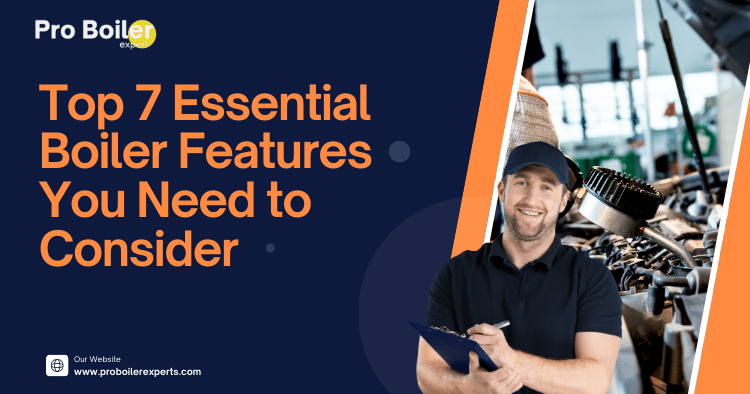Table of Contents
- 1. Energy Efficiency
- 2. Size and Capacity
- 3. Type of Boiler
- 4. Control Systems
- 5. Safety Features
- 6. Maintenance Requirements
- 7. Warranty and Support
Choosing the right boiler for your home can seem daunting, given the plethora of options available. A boiler is a significant investment, and understanding the essential features can help you make an informed decision. In this article, we’ll explore the top seven essential boiler features to consider before making your purchase.
1. Energy Efficiency
Energy efficiency is one of the most critical factors to consider when purchasing a boiler. A high-efficiency boiler can significantly reduce your energy bills while minimizing your carbon footprint.
- AFUE Ratings: Look for a boiler with a high Annual Fuel Utilization Efficiency (AFUE) rating. This percentage indicates how much fuel is converted into usable heat. Boilers with an AFUE rating of 90% or higher are considered high-efficiency models.
“A high-efficiency boiler is not just an investment; it’s a commitment to sustainability.”
- Energy Star Certification: Boilers that meet the U.S. Environmental Protection Agency’s guidelines for energy efficiency carry the Energy Star label. Choosing an Energy Star-certified boiler can further assure you of its efficiency.
- Cost Savings: Although high-efficiency boilers may have a higher upfront cost, the savings on energy bills can lead to a quick return on investment. For a detailed comparison of boiler efficiencies, check out the Energy Star website.
For additional insights on energy-efficient options, explore the Top 5 Gas Boilers for Efficient Home Heating in 2024 and Top 5 Electric Boilers for Efficient Home Heating in 2024.
2. Size and Capacity
The size and capacity of your boiler play a crucial role in its performance and efficiency. An improperly sized boiler can lead to unnecessary energy consumption or inadequate heating.
- BTU Requirements: Boilers are rated in British Thermal Units (BTUs), which measure the amount of heat they produce. The right BTU rating for your home depends on several factors, including square footage, insulation levels, and climate.
“Choosing the right size is as crucial as selecting the right model.”
- Professional Assessment: It’s often best to consult with a heating professional to determine the correct size for your needs. They can perform a load calculation to ensure your boiler operates efficiently.
| Home Size (sq ft) | Recommended BTUs |
|---|---|
| 1,000 – 1,500 | 30,000 – 40,000 |
| 1,500 – 2,000 | 40,000 – 60,000 |
| 2,000 – 2,500 | 60,000 – 80,000 |
3. Type of Boiler
There are various types of boilers available, each with unique features and benefits. Understanding these will help you choose the right one for your home.
- Combi Boilers: These are compact and provide both heating and hot water on demand, making them ideal for smaller homes. For more information on the benefits of combi boilers, see Top 5 Benefits of Choosing Combi Boilers for Your Home.
- System Boilers: These boilers provide hot water to multiple taps simultaneously and are suitable for larger households. Explore the Top 5 Benefits of Choosing a System Boiler for Your Home for more insights.
“Selecting the right type of boiler can enhance your home’s overall efficiency and comfort.”
- Conventional Boilers: Also known as heat-only boilers, these require a separate hot water cylinder and are best for homes with high hot water demands. Check out Top 5 Benefits of Conventional Boilers for Your Home for additional details.
Research the different types to find the best fit for your lifestyle and home layout.
4. Control Systems
Modern boilers come equipped with advanced control systems that enhance user experience and efficiency.
- Smart Thermostats: Many boilers can connect with smart thermostats, allowing you to control your heating remotely via a smartphone app. For a look at the latest in smart heating technology, see Top 5 Smart Boilers Revolutionizing Home Heating in 2024.
“Smart technology is transforming how we manage our home heating needs.”
- Zoning Systems: If your home has multiple heating zones, consider a boiler that supports zoning controls. This feature allows you to heat specific areas of your home based on your preferences.
- Weather Compensation: Some advanced models can adjust the heating output based on outside temperatures, optimizing energy use and comfort levels.
These control systems not only improve comfort but can also lead to significant energy savings.
5. Safety Features
Safety is paramount when it comes to heating systems. Here are some essential safety features to look for in a boiler:
- Pressure Relief Valve: This safety feature releases excess pressure from the boiler, preventing potential explosions.
“Your safety is worth the investment in reliable boiler features.”
- Flame Failure Device: This device automatically shuts off the gas supply if the flame goes out, reducing the risk of gas leaks.
- Carbon Monoxide Detector: It’s crucial to have a CO detector installed near your boiler. Many modern boilers come with built-in detectors, providing an extra layer of safety.
Always ensure your boiler is installed by a qualified technician to maximize safety.
6. Maintenance Requirements
Regular maintenance is key to keeping your boiler running efficiently and prolonging its lifespan.
- Annual Servicing: Most manufacturers recommend an annual service to check for efficiency and safety issues. Consider signing up for a maintenance plan that includes regular checks and repairs.
“Preventive maintenance is a small price to pay for peace of mind.”
- Self-Diagnostic Tools: Some modern boilers come with self-diagnostic features that alert you to potential issues before they become major problems.
- Ease of Access: When selecting a boiler, consider its location. A boiler that is easy to access will make maintenance checks simpler and less expensive. For a checklist of essential pre-installation considerations, refer to Essential Pre-Installation Checklist for Your New Boiler.
7. Warranty and Support
A robust warranty and reliable customer support can save you time and money in the event of a malfunction.
- Warranty Duration: Look for a boiler with a comprehensive warranty that covers both parts and labor. Many manufacturers offer warranties ranging from 1 to 10 years.
“A good warranty is a safeguard against unexpected costs down the line.”
- Customer Support: Research the manufacturer’s reputation for customer support. Reading reviews and seeking recommendations can provide insight into their reliability.
- Service Availability: Ensure that there are qualified technicians available in your area for repairs and maintenance. This will minimize downtime and inconvenience. For tips on choosing the right boiler installer, check out Top 5 Tips for Choosing the Right Boiler Installer.
FAQs
Q1: How often should I service my boiler?
A1: It’s recommended to service your boiler annually to ensure it operates efficiently and safely.
Q2: What is the average lifespan of a boiler?
A2: Most boilers last between 10 to 15 years, but with proper maintenance, some can function well beyond that.
Q3: Can I install a boiler myself?
A3: It’s highly recommended to hire a qualified technician for boiler installation to ensure safety and compliance with local regulations.
Choosing the right boiler for your home doesn’t have to be overwhelming. By considering these essential features, you can make an informed decision that meets your heating needs while ensuring safety, efficiency, and comfort. Happy heating!




